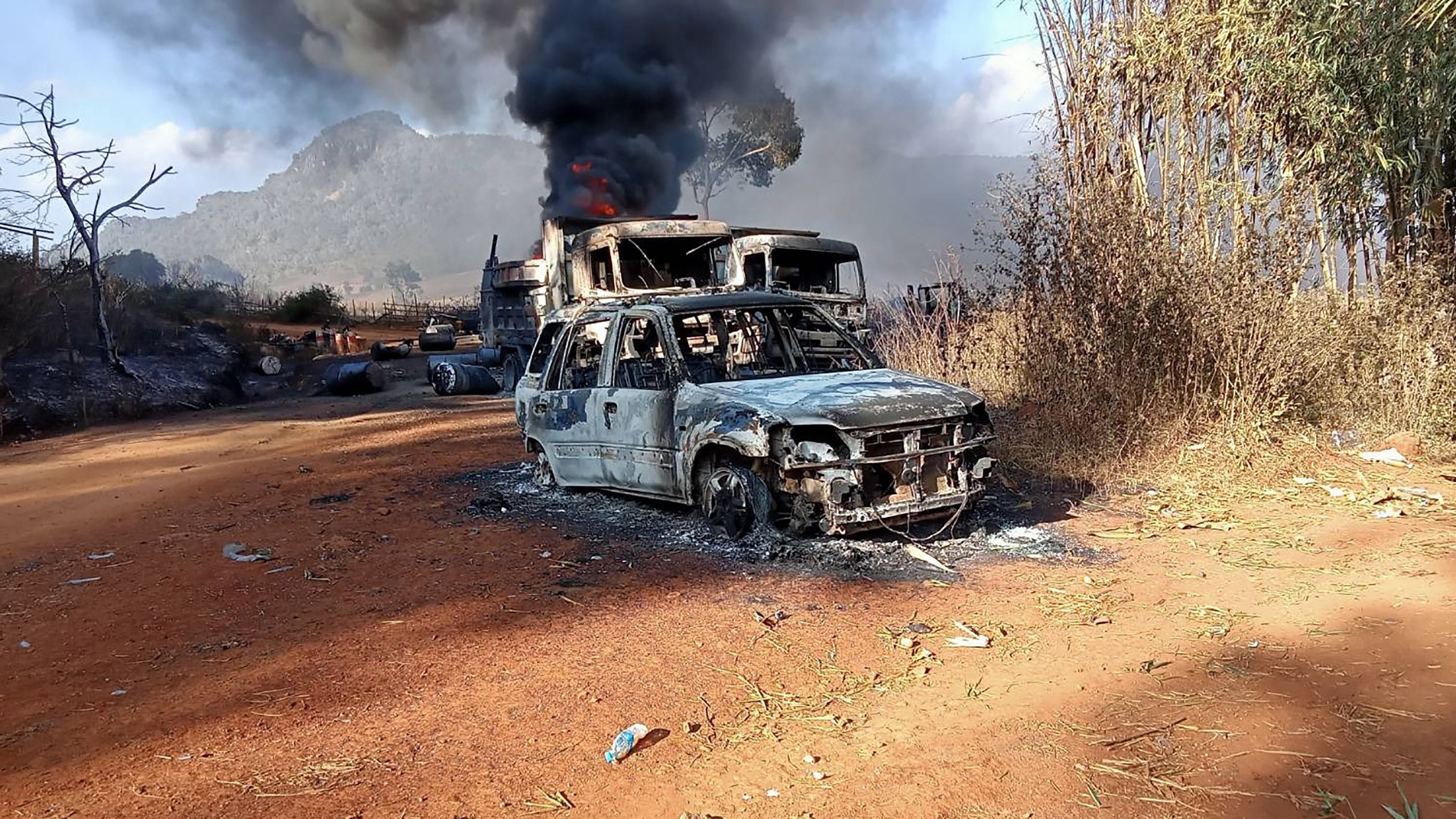Burnt bodies of more than 30 found in Myanmar’s Kayah state, reports say
Myanmar’s junta claims it killed an unspecified number of ‘terrorists with weapons’

Your support helps us to tell the story
From reproductive rights to climate change to Big Tech, The Independent is on the ground when the story is developing. Whether it's investigating the financials of Elon Musk's pro-Trump PAC or producing our latest documentary, 'The A Word', which shines a light on the American women fighting for reproductive rights, we know how important it is to parse out the facts from the messaging.
At such a critical moment in US history, we need reporters on the ground. Your donation allows us to keep sending journalists to speak to both sides of the story.
The Independent is trusted by Americans across the entire political spectrum. And unlike many other quality news outlets, we choose not to lock Americans out of our reporting and analysis with paywalls. We believe quality journalism should be available to everyone, paid for by those who can afford it.
Your support makes all the difference.At least 35 burnt bodies, including those of women and children, were found near a village in the conflict-torn eastern state of Kayah in Myanmar on Christmas morning.
The charred bodies were found in eight burned vehicles and on five motorbikes near Mo So village of Hpruso town.
The bodies belonged to elderly people, women and children, according to the local Karenni Human Rights Group.
“We strongly denounce the inhumane and brutal killing which violates human rights,” the group said in a Facebook post.
The Karenni National Defence Force (KNDF) has accused the country’s military rulers of the killings.
The KNDF is one of the largest of several civilian militias that have opposed the junta since it took power in a coup.
The Myanmar military, in turn, has claimed it shot and killed an unspecified number of “terrorists with weapons” from the opposition armed forces in the village, reported Reuters.
The people were in seven vehicles and did not stop for the military, the military’s officials were quoted as saying by state media.
The KNDF said the dead were civilians seeking refuge from the conflict.
An unnamed commander of the KNDF told Myanmar-based independent news agency Myanmar Now that members of his group saw smoke billowing out of parked vehicles at around 11am on Friday.
They did not see the burned bodies, however, as the vehicles were still on fire.
“We don’t know exactly how many women, men and children are among those burned. Some became ashes, some others were charred. The [bodies] were no longer recognisable or identifiable when we saw them,” the commander said.
“We were so shocked at seeing that all the dead bodies were [of] different sizes, including children, women and old people,” a commander from the group, who wanted to remain anonymous told Reuters.
A villager, who also did not want to be named, said he saw the burnt dead bodies and that there were “clothes of children and women spread around.”
He added that he was aware of the fire on Friday night but could not go near as gunshots were being fired as well.
According to the rebel group, around 100 troops from the Myanmar army’s Light Infantry Division 66 had made advances towards Hpruso town on Friday.
The army then clashed with the rebel group and members of the Karenni Army near Moso village.
During the standoff, army troops allegedly assaulted and arrested villagers while ransacking their property.
The military also allegedly killed four members of the Karenni Border Guard Force (BGF), a part of the KNDF, who attempted to stop the junta from terrorising the villagers, the defence force said.
“They arrested four members of the BGF Battalion 1004 and tied them up before executing them by shooting them in the head,” a statement from the KNDF force said.
The incident comes even as reports emerged of the junta unleashing airstrikes and heavy artillery on Lay Kay Kaw, a small town near the Thai border controlled by ethnic guerrillas, sending hundreds of people fleeing across a river into Thailand on Friday.
On Monday, an investigation by the BBC and UK-based nonprofit Myanmar Witness accused the military of carrying out 40 extra-judicial killings in four separate incidents in July this year.
The south Asian country has been in turmoil since the military overthrew the elected government of Aung San Suu Kyi in a daylight coup in February.
The junta alleged fraud in a November election that her party had won. Independent observers, however, have said the ballot was fair.
Civilians have since been taking up arms in protest, and have demanded the restoration of democracy.
The National Unity Government, a broad alliance of anti-coup organisations that include members of Ms Suu Kyi’s ousted ruling party, has backed the training and formation of militias called the People’s Defence Forces and has declared a nationwide rebellion against military rule.
Additional reporting by agencies
Join our commenting forum
Join thought-provoking conversations, follow other Independent readers and see their replies
Comments